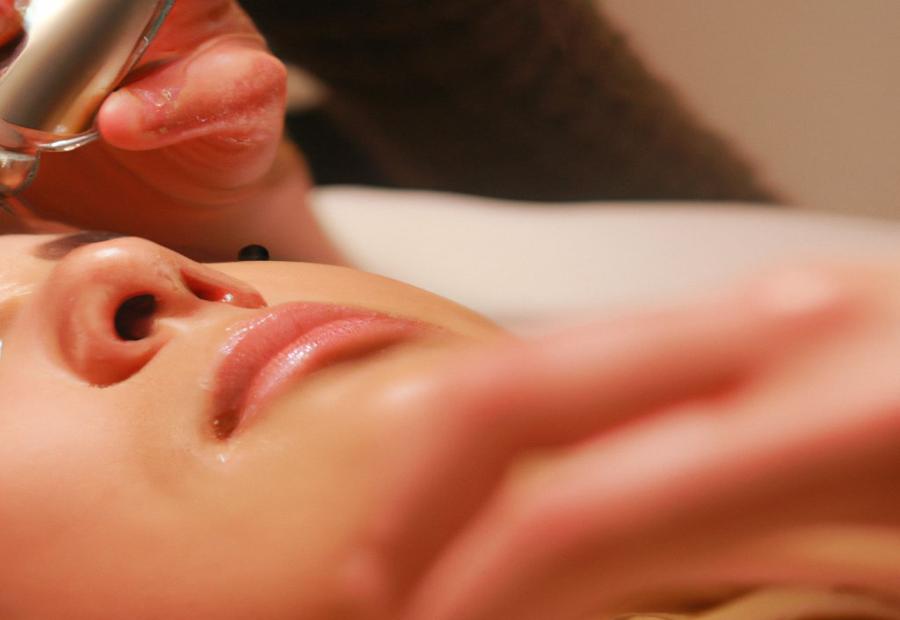Last Updated on 9 months by Francis
.jpg)
Microneedling is a popular cosmetic procedure that involves using a device with tiny needles to create micro-injuries on the skin’s surface. This stimulates the body’s natural healing process and promotes the production of collagen and elastin, resulting in smoother and more rejuvenated skin. However, when it comes to performing microneedling during pregnancy, there are important considerations to keep in mind.
The safety of microneedling during pregnancy is a topic of debate among healthcare professionals. While there is limited research specifically addressing microneedling’s safety during pregnancy, several factors raise concerns about its potential risks and effects on both the mother and the developing fetus.
1. Understanding the Risks: Microneedling involves puncturing the skin, which can introduce the risk of infection and potential complications during pregnancy.
2. Potential Absorption of Chemicals: Some microneedling treatments involve the application of topical serums or creams containing active ingredients. These substances may be absorbed into the bloodstream, and their effects on the developing baby are not well understood.
3. Hormonal Changes and Sensitivity: Pregnancy induces hormonal changes in the body, which can make the skin more sensitive. Microneedling may cause increased skin irritation and discomfort due to these hormonal fluctuations.
4. Skin Sensitivity: Pregnancy can also increase skin sensitivity and make it more prone to pigmentation issues and scarring. Microneedling may exacerbate these concerns and may not yield the desired results.
Considering the potential risks associated with microneedling during pregnancy, it is generally recommended to avoid the procedure until after childbirth. However, there are alternative skincare treatments and precautions that pregnant individuals can take to maintain healthy skin during this time.
It is important to note that the safety of microneedling during breastfeeding is also a concern. Similar risks related to chemical absorption and potential transfer of substances to the baby through breast milk exist. It is advisable to consult with a healthcare provider before considering microneedling while breastfeeding.
If you are pregnant and interested in skincare treatments, it is essential to prioritize the well-being of yourself and your baby. Consultation with a healthcare provider, using pregnancy-safe skincare products, and patch testing on a small area of skin are important precautions to take when considering any skincare treatment during pregnancy. Your healthcare provider can provide guidance and recommend safe alternatives to microneedling to address your skincare concerns while ensuring the safety of you and your baby.
Contents
Key takeaway:
- Microneedling should be avoided during pregnancy: Due to the potential risks associated with microneedling, it is recommended to avoid the procedure during pregnancy. This is to ensure the safety of the fetus and to prevent any potential harm.
- Potential absorption of chemicals: Microneedling involves the use of skincare products that can be absorbed into the bloodstream. Pregnant women should be cautious as these substances may reach the fetus and have unknown effects.
- Precautions and alternatives: It is important to consult with a healthcare provider before considering any skincare procedures during pregnancy. There are alternative treatments available that are safe and suitable for pregnant women.
What is Microneedling?
What is Microneedling? Microneedling is a cosmetic procedure that involves using a device with tiny needles to create small punctures on the skin’s surface. These micro-injuries stimulate the body’s natural healing response, leading to increased collagen and elastin production, as well as improved skin texture and appearance.
During microneedling, the needles penetrate the skin to a controlled depth, usually between 0.5 to 2.5 millimeters. This depth can be adjusted based on the specific concerns being addressed and the desired results. The procedure can be performed on various areas of the body, including the face, neck, hands, and even the scalp.
Microneedling is often used to treat acne scars, fine lines and wrinkles, uneven skin tone, and stretch marks. It can also enhance the effectiveness of skincare products by allowing better absorption into the skin.
It is important to note that microneedling should be performed by a trained professional in a clean and sterile environment. The procedure may cause some redness, swelling, and mild discomfort, but these side effects typically subside within a few days.
Suggestions:
-
Consult with a dermatologist or esthetician to discuss if microneedling is suitable for your skin concerns.
-
Research reputable clinics or professionals who specialize in microneedling procedures.
-
Follow pre and post-treatment care instructions provided by the professional.
-
Consider combining microneedling with other skincare treatments for enhanced results.
-
Prioritize your skin’s health by maintaining a consistent skincare routine and sun protection.
Is Microneedling Safe during Pregnancy?

Photo Credits: Infraredforhealth.Com by Kevin Clark
Looking to pamper your skin while expecting a little one? Let’s dive into the question of whether microneedling is safe during pregnancy. We’ll explore the risks involved, potential absorption of chemicals, and how hormonal changes can affect your skin’s sensitivity. Discover the facts you need to know to make an informed decision about this popular beauty treatment during this precious phase of life.
Understanding the Risks
Understanding the risks:
There are several risks associated with microneedling during pregnancy that need to be understood.
Potential absorption of chemicals: Microneedling typically involves the use of serums or topical solutions, which can be absorbed into the bloodstream. While most skincare products used during microneedling are safe, some may contain ingredients that could pose a risk to the developing fetus.
Hormonal changes and sensitivity: Pregnancy causes hormonal fluctuations that can affect the skin’s sensitivity. Microneedling may cause increased sensitivity and discomfort for pregnant individuals.
Skin sensitivity: Pregnancy hormones can make the skin more sensitive and reactive. Microneedling can potentially cause redness, irritation, and inflammation in pregnant individuals with sensitive skin.
It is important to consult with a healthcare provider before considering microneedling during pregnancy to fully understand the potential risks and make an informed decision for the safety of both the pregnant individual and the fetus.
Potential Absorption of Chemicals
During pregnancy, there is a concern about the potential absorption of chemicals during microneedling. This is because microneedling involves creating small punctures on the skin’s surface, which can increase the permeability of the skin and potentially allow for the absorption of chemicals into the bloodstream. It is important to note that there is limited research specifically on the absorption of chemicals during microneedling in pregnant women.
However, as a precautionary measure, it is recommended to avoid using any products or serums that contain potentially harmful chemicals during microneedling while pregnant. This includes ingredients such as retinoids, hydroquinone, and salicylic acid, among others. Instead, opt for pregnancy-safe skincare products that do not contain these potentially harmful chemicals.
It is also essential to consult with a healthcare provider before undergoing microneedling during pregnancy. They can provide personalized advice and guidance based on your unique situation and medical history.
By being mindful of the potential absorption of chemicals and following these precautions, you can ensure the safety of both you and your baby during microneedling while pregnant.
Hormonal Changes and Sensitivity
During pregnancy, it is important to consider the impact of hormonal changes on the skin’s sensitivity.
Hormonal fluctuations during this time can make the skin more sensitive and reactive, which may increase the risk of irritation or inflammation during microneedling. Furthermore, hormonal changes can also affect the healing process and the body’s response to the treatment.
Therefore, consulting with a healthcare provider before undergoing microneedling during pregnancy is crucial in order to assess the potential risks and benefits. This ensures the safety of both the mother and the baby. It is essential to follow professional advice and make an informed decision about whether to proceed with microneedling during this sensitive period.
Skin Sensitivity
During pregnancy, it is common for the skin to experience increased sensitivity due to hormonal changes. This heightened sensitivity should be taken into consideration when deciding whether to undergo microneedling, a procedure that involves using small needles to stimulate collagen production and rejuvenate the skin.
If you have sensitive skin, microneedling during pregnancy may lead to discomfort or adverse reactions. The hormonal changes that occur during pregnancy can also impact the skin’s healing process, potentially prolonging the time it takes for the skin to recover from the procedure and increasing the risk of complications.
To ensure your safety, it is advisable to consult with a healthcare provider before considering microneedling while pregnant. They can assess the condition of your skin and provide guidance on whether the procedure is suitable for you.
Prior to and after the microneedling procedure, it is important to use skincare products that are safe for use during pregnancy to minimize the risk of irritation or adverse reactions. These skincare products should be gentle and free from any ingredients that may be potentially harmful.
Before undergoing microneedling, it is also recommended to conduct a patch test to evaluate your skin’s reaction. This involves applying a small amount of the treatment solution on a small area of skin to check for any negative responses.
Considering the potential risks and the increased skin sensitivity during pregnancy, it is generally advisable to avoid microneedling during this time. It would be beneficial to explore alternative skincare treatments that are both safe and suitable for pregnant individuals.
Keep in mind that each person’s skin is unique, and it is crucial to consult with a healthcare provider for personalized advice regarding microneedling and other skincare procedures during pregnancy.
What are the Alternatives to Microneedling during Pregnancy?
During pregnancy, it is important to consider safe alternatives to microneedling. Instead of undergoing microneedling, pregnant individuals can explore other skincare options that are safer for their health and the health of their baby. Here are some alternatives to microneedling during pregnancy:
1. Gentle exfoliation: Opt for gentle exfoliation methods such as chemical exfoliants containing ingredients like glycolic acid or lactic acid. These help to remove dead skin cells and promote cell turnover without the need for needles.
2. Hydrating masks: Use hydrating masks that nourish and moisturize the skin. Look for masks with ingredients like hyaluronic acid, aloe vera, or chamomile, which can help improve skin texture and provide a soothing effect.
3. Moisturizers: Choose moisturizers that are specifically designed for pregnant women. Look for ingredients like shea butter, cocoa butter, or coconut oil, as these can help keep the skin hydrated and reduce the appearance of fine lines.
4. Sunscreen: Protect your skin from harmful UV rays by applying a broad-spectrum sunscreen with an SPF of 30 or higher. Sun protection is essential during pregnancy to prevent skin damage and discoloration.
5. Consult a dermatologist: If you have specific skin concerns during pregnancy, it’s best to consult with a dermatologist who can recommend safe and effective treatments or skincare products suitable for pregnant individuals.
Remember, always prioritize the safety of you and your baby during pregnancy. It’s essential to discuss any skincare concerns with a healthcare professional or dermatologist before trying any new products or treatments.
Is Microneedling Safe during Breastfeeding?
Can you do microneedling while pregnant? Let’s find out if microneedling is safe during breastfeeding. We’ll explore the safety concerns and potential transfer of substances in this context. Stick around to learn about the facts and guidelines regarding microneedling during the breastfeeding phase.
Safety Concerns
When considering microneedling during pregnancy, it is important to keep in mind the safety concerns. One of the potential risks is the increased risk of infection. Microneedling involves creating tiny punctures in the skin, which can lead to infection. During pregnancy, the immune system may be compromised, so it is crucial to ensure proper sterilization and hygiene during the procedure. Another concern is the potential for skin irritation. Pregnant women may have heightened sensitivity or allergic reactions to certain substances. Since microneedling involves the use of serums or topical solutions, there is a possibility of skin irritation or adverse reactions. Additionally, there is a concern about the potential absorption of chemicals. Some topical solutions used during microneedling may contain chemicals that could be absorbed into the bloodstream. It is important to minimize exposure to potential harmful substances during pregnancy.
Potential Transfer of Substances
While undergoing microneedling, there exists a chance of substances being transferred to the body.
Important Precautions to Take with Microneedling during Pregnancy

Photo Credits: Infraredforhealth.Com by Jesse Moore
During pregnancy, taking extra precautions is crucial, especially when it comes to beauty treatments like microneedling. In this section, we will cover some important considerations to keep in mind if you’re considering microneedling while pregnant. From consulting with your healthcare provider to using pregnancy-safe skincare products, we’ll explore the necessary steps to ensure a safe and healthy experience. Additionally, we’ll touch on the significance of patch testing to minimize any potential risks. Let’s dive in and learn how to navigate microneedling during this precious time.
Consultation with a Healthcare Provider
When considering microneedling while pregnant, it is crucial to schedule a consultation with a healthcare provider. This is necessary to ensure the safety of the procedure and the well-being of both you and your baby. Consulting with a healthcare professional, such as an obstetrician or dermatologist, is essential to evaluate your specific circumstances and provide expert guidance based on your medical history.
During the consultation, your healthcare provider will take into account factors such as the stage of your pregnancy, any underlying health conditions, and the potential risks associated with microneedling. They will address any concerns you may have and clarify whether this procedure is suitable for you during pregnancy. Additionally, they will provide you with detailed information about the potential benefits and risks, equipping you to make an informed decision.
It is important to prioritize your health and the health of your baby throughout your pregnancy. Trust the expertise of healthcare professionals and follow their recommendations in order to make the best choices for your well-being and the well-being of your baby.
Using Pregnancy-Safe Skincare Products
Using pregnancy-safe skincare products is vital during pregnancy to ensure the well-being of both the mother and the baby. It is crucial to remember that certain skincare ingredients can potentially harm the developing fetus. Therefore, it is essential to opt for pregnancy-safe products.
Pregnancy-safe skincare products are those that do not contain harmful ingredients such as retinoids, salicylic acid, and hydroquinone. Instead, they are formulated with gentle and safe ingredients for pregnant women, such as aloe vera, chamomile, and shea butter.
These pregnancy-safe skincare products can effectively address common skin concerns during pregnancy, including dryness, sensitivity, and stretch marks. They provide hydration, soothe the skin, and promote its elasticity.
When choosing pregnancy-safe skincare products, it is recommended to carefully read the labels and look for products specifically labeled as safe for use during pregnancy. Additionally, consulting with a healthcare provider or dermatologist can provide further guidance and recommendations.
By using pregnancy-safe skincare products, expectant mothers can maintain healthy and nourished skin while minimizing any potential risks to the developing baby. Take care of your skin during pregnancy by using products specifically formulated for the safety and well-being of both you and your baby.
Patch Testing
When considering the safety of microneedling during pregnancy, it is important to conduct a patch test to ensure that your skin does not have an adverse reaction to the procedure. Here is a step-by-step guide on how to perform a patch test:
- Clean a small area of your skin, preferably on the inside of your wrist or behind your ear.
- Apply a small amount of the microneedling product or serum that will be used during the procedure to the patch test area.
- Gently massage the product into the skin and leave it on for at least 24 hours.
- Check the patch test area for any signs of redness, irritation, or inflammation.
- If there are no negative reactions after 24 hours, it is likely safe to proceed with the microneedling procedure.
Keep in mind that even if the patch test results are negative, it is still important to consult with your healthcare provider before undergoing microneedling during pregnancy.
Pro-tip: Patch testing is an essential precautionary step before any skincare procedure, especially during pregnancy. It helps to ensure the safety and compatibility of the products with your skin, minimizing the risk of adverse reactions.
Some Facts About Microneedling While Pregnant:
- ✅ Microneedling is a popular skincare treatment that involves puncturing the skin with tiny needles. (Source: Our Team)
- ✅ Microneedling is often used to improve the appearance of acne scars, fine lines, and wrinkles. (Source: Our Team)
- ✅ Microneedling can help improve the appearance of stretch marks for pregnant women. (Source: Our Team)
- ✅ Microneedling is a minimally invasive procedure with little to no downtime. (Source: Our Team)
- ✅ Microneedling is generally considered safe during pregnancy, especially with shallow needles. (Source: Our Team)
Frequently Asked Questions
Can you do microneedling while pregnant?
No, microneedling is not recommended for pregnant women due to potential risks. It is important to prioritize the health of both the mother and the baby during pregnancy and consult with a healthcare provider for safe skincare alternatives.
Is microneedling safe for pregnant women?
No, microneedling is not considered safe for pregnant women. It carries a risk of infection and may affect fertility or harm a developing fetus due to the immune response it triggers. It is best to consult with a doctor before considering microneedling during pregnancy.
What are the risks of microneedling during pregnancy?
The risks associated with microneedling during pregnancy include an increased risk of infection, the potential triggering of herpes, increased skin sensitivity, discoloration, and increased absorption of chemicals from skincare products. There is also a possibility of harm to the unborn baby.
What are the alternatives to microneedling for pregnant women?
Safe alternatives to microneedling for pregnant women include gentle facials, hydrating facials, and LED facials. These treatments can improve the appearance of the skin without the potential risks associated with microneedling. It is important to consult with a healthcare provider for personalized recommendations.
Can I use skincare products with benzoyl peroxide while pregnant?
No, it is recommended to avoid skincare products with benzoyl peroxide during pregnancy. It is one of the skincare ingredients to avoid while pregnant due to its potential effects on the developing baby. It is best to consult with a doctor or dermatologist for safe alternatives.
Are high concentrations of chemical peels safe during pregnancy?
No, high concentrations of chemical peels should be avoided during pregnancy due to their potential to cause birth defects or pregnancy complications. It is recommended to opt for lighter peels containing glycolic, lactic, or azelaic acid, which are considered safer. Consult with a healthcare provider for personalized advice on skincare during pregnancy.

.jpg)
.jpg)
.jpg)
.jpg)


